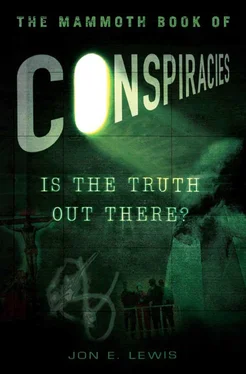Jon Lewis - The Mammoth Book of Conspiracies
Здесь есть возможность читать онлайн «Jon Lewis - The Mammoth Book of Conspiracies» весь текст электронной книги совершенно бесплатно (целиком полную версию без сокращений). В некоторых случаях можно слушать аудио, скачать через торрент в формате fb2 и присутствует краткое содержание. Город: London, Год выпуска: 2012, ISBN: 2012, Издательство: Robinson, Жанр: Прочая документальная литература, на английском языке. Описание произведения, (предисловие) а так же отзывы посетителей доступны на портале библиотеки ЛибКат.
- Название:The Mammoth Book of Conspiracies
- Автор:
- Издательство:Robinson
- Жанр:
- Год:2012
- Город:London
- ISBN:978-1-84901-363-5
- Рейтинг книги:3 / 5. Голосов: 1
-
Избранное:Добавить в избранное
- Отзывы:
-
Ваша оценка:
- 60
- 1
- 2
- 3
- 4
- 5
The Mammoth Book of Conspiracies: краткое содержание, описание и аннотация
Предлагаем к чтению аннотацию, описание, краткое содержание или предисловие (зависит от того, что написал сам автор книги «The Mammoth Book of Conspiracies»). Если вы не нашли необходимую информацию о книге — напишите в комментариях, мы постараемся отыскать её.
Jon E. Lewis is a historian and writer, whose books on history and military history are sold worldwide. He is also the editor of many
anthologies, including the best-selling
.
The Mammoth Book of Conspiracies — читать онлайн бесплатно полную книгу (весь текст) целиком
Ниже представлен текст книги, разбитый по страницам. Система сохранения места последней прочитанной страницы, позволяет с удобством читать онлайн бесплатно книгу «The Mammoth Book of Conspiracies», без необходимости каждый раз заново искать на чём Вы остановились. Поставьте закладку, и сможете в любой момент перейти на страницу, на которой закончили чтение.
Интервал:
Закладка:
We must overthrow all order, suppress all laws, annul all power, and leave the people in anarchy. The laws we establish will not perhaps be in force at once, but at any rate, having given back the power to the people, they will resist for the sake of their liberty which they will believe they are preserving. We must caress their vanity, flatter their hopes, promise them happiness after our work has been in operation; we must elude their caprices and their systems at will, for the people as legislators are very dangerous, they only establish laws which coincide with their passions, their want of knowledge would besides only give birth to abuses. But as the people are a lever which legislators can move at their will, we must necessarily use them as a support, and render hateful to them everything we wish to destroy and sow illusions in their path; we must also buy all the mercenary pens which propagate our methods and which will instruct the people concerning their enemies whom we attack. The clergy, being the most powerful through public opinion, can only be destroyed by ridiculing religion, rendering its ministers odious, and only representing them as hypocritical monsters, for Mahomet in order to establish his religion first defamed the paganism which the Arabs, the Sarmathes, and the Scythians professed. Libels must at every moment show fresh traces of hatred against the clergy. To exaggerate their riches, to make the sins of an individual appear to be common to all, to attribute to them all vices; calumny, murder, irreligion, sacrilege, all is permitted in times of revolution.
We must degrade the “noblesse” and attribute it to an odious origin, establish a germ of equality which can never exist but which will flatter the people; [we must] immolate the most obstinate, burn and destroy their property in order to intimidate the rest, so that if we cannot entirely destroy this prejudice we can weaken it and the people will avenge their vanity and their jealousy by all the excesses which will bring them to submission.
After describing how the soldiers are to be seduced from their allegiance, and the magistrates represented to the people as despots,“since the people, brutal and ignorant, only see the evil and never the good of things”, the writer explains they must be given only limited power in the municipalities:
Let us beware above all of giving them too much force; their despotism is too dangerous, we must flatter the people by gratuitous justice, promise them a great diminution in taxes and a more equal division, more extension in fortunes, and less humiliation. These phantasies [“vertiges”] will fanaticise the people, who will flatten out all resistance. What matter the victims and their numbers? spoliations, destructions, burnings, and all the necessary effects of a revolution? nothing must be sacred and we can say with Machiavelli: “What matter the means as long as one arrives at the end?”
Were all these the ideas of Mirabeau, or were they, like the other document of the Illuminati found amongst his papers, the programme of a conspiracy? I incline to the latter theory. The plan of campaign was, at any rate, the one followed out by the conspirators, as Chamfort, the friend and confidant of Mirabeau, admitted in his conversation with Marmontel:
The nation is a great herd that only thinks of browsing, and with good sheepdogs the shepherds can lead it as they please… Money and the hope of plunder are all-powerful with the people…
Mirabeau cheerfully asserts that with 100 louis one can make quite a good riot.
Another contemporary thus describes the methods of the leaders:
Mirabeau, in the exuberance of an orgy, cried one day: “That ‘canaille’ well deserves to have us for legislators!” These professions of faith, as we see, are not at all democratic; the sect uses the populace as revolution fodder [“chair à révolution”], as prime material for brigandage, after which it seizes the gold and abandons generations to torture. It is veritably the code of hell.
It is this “code of hell” set forth in the “Projet de Révolution” that we shall find repeated in succeeding documents throughout the last hundred years—in the correspondence of the “Alta Vendita”, in the “Dialogues aux Enfers entre Machiavel et Montesquieu” by Maurice Joly, in the Revolutionary Catechism of Bakunin, in the Protocols of the Elders of Zion, and in the writings of the Russian Bolsheviks today.
Whatever doubts may be cast on the authenticity of any of these documents, the indisputable fact thus remains that as early as 1789 this Machiavellian plan of engineering revolution and using the people as a lever for raising a tyrannical minority to power, had been formulated; further, that the methods described in this earliest “Protocol” have been carried out according to plan from that day to this. And in every outbreak of the social revolution the authors of the movement have been known to be connected with secret societies.
It was Adrien Duport, author of the “‘Great Fear”’ that spread over France on July 22, 1789, Duport, the inner initiate of the secret societies, “holding in his hands all the threads of the masonic conspiracy”, who on May 21, 1790, set forth before the Committee of Propaganda the vast scheme of destruction:
M. de Mirabeau has well established the fact that the fortunate revolution which has taken place in France must and will be for all the peoples of Europe the awakening of liberty and for Kings the sleep of death.
But Duport goes on to explain that whilst Mirabeau thinks it advisable at present not to concern themselves with anything outside France, he himself believes that the triumph of the French Revolution must lead inevitably to “the ruin of all thrones… Therefore we must hasten among our neighbours the same revolution that is going on in France.”
The plan of illuminized Freemasonry was thus nothing less than world-revolution.
At the beginning of the Revolution, Orléanism and Freemasonry thus formed a united body. According to Lombard de Langres:
France in 1789 counted more than 2,000 lodges affiliated to the Grand Orient; the number of adepts was more than 100,000. The first events of 1789 were only Masonry in action. All the revolutionaries of the Constituent Assembly were initiated into the third degree. We place in this class the Duc d’Orléans, Valence, Syllery, Laclos, Sièyes, Pétion, Menou, Biron, Montesquieu, Fauchet, Condorcet, Lafayette, Mirabeau, Garat, Rabaud, Dubois-Crancé, Thiébaud, Larochefoucauld, and others.
Amongst these others were not only the Brissotins, who formed the nucleus of the Girondin party, but the men of the Terror—Marat, Robespierre, Danton, and Desmoulins.
It was these fiercer elements, true disciples of the Illuminati, who were to sweep away the visionary Masons dreaming of equality and brotherhood. Following the precedent set by Weishaupt, classical pseudonyms were adopted by these leaders of the Jacobins, thus Chaumette was known as Anaxagoras, Clootz as Anacharsis, Danton as Horace, Lacroix as Publicola, and Ronsin as Scaevola ; again, after the manner of the Illuminati, the names of towns were changed and a revolutionary calendar was adopted. The red cap and loose hair affected by the Jacobins appear also to have been foreshadowed in the lodges of the Illuminati.
Yet faithfully as the Terrorists carried out the plan of the Illuminati, it would seem that they themselves were not initiated into the innermost secrets of the conspiracy. Behind the Convention, behind the clubs, behind the Revolutionary Tribunal, there existed, says Lombard de Langres, that “most secret convention [‘convention sécrétissime’] which directed everything after May 31, an occult and terrible power of which the other Convention became the slave and which was composed of the prime initiates of Illuminism. This power was above Robespierre and the committees of the government,… it was this occult power which appropriated to itself the treasures of the nation and distributed them to the brothers and friends who had helped on the great work.”
Читать дальшеИнтервал:
Закладка:
Похожие книги на «The Mammoth Book of Conspiracies»
Представляем Вашему вниманию похожие книги на «The Mammoth Book of Conspiracies» списком для выбора. Мы отобрали схожую по названию и смыслу литературу в надежде предоставить читателям больше вариантов отыскать новые, интересные, ещё непрочитанные произведения.
Обсуждение, отзывы о книге «The Mammoth Book of Conspiracies» и просто собственные мнения читателей. Оставьте ваши комментарии, напишите, что Вы думаете о произведении, его смысле или главных героях. Укажите что конкретно понравилось, а что нет, и почему Вы так считаете.











